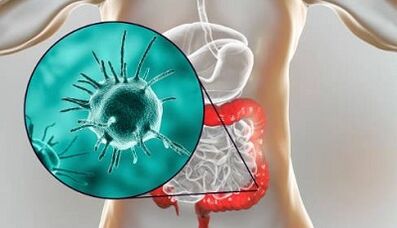
Parasitic diseases are a large group of diseases caused by helminths, some arthropods and protozoa.
Despite all the achievements of modern medicine and the hygiene developed, according to statistics, about 90% of people worldwide face these pathologies at least once in a lifetime.In this article you can find how to suspect a disease and what tests to detect parasites.
Types of parasites
Parasites are organisms that survive from the vital activity of living beings.When they settle in the human body, during their growth and reproduction they cause a deficiency of microelements, vitamins, proteins and other nutrients.Both can lead to relapses and exacerbations of chronic pathologies and cause damage to internal organs on their own.
There are the following types of parasites that can cause diseases in humans:
- protozoa (ameba, lamblia);
- pathogenic microorganisms (chlamydia, mycoplasma and others);
- Helmintos (intestinal worms, oxy, bovine and pigs, etc.);
- parasitic arthropods (scabies mite, demodex).
The main characteristic of the pathologies they cause is an asymptomatic or not very symptomatic prolonged course.The parasites skillfully hide their existence, trying to "squeeze everything from the body of the host" until their reserves are exhausted and the organ or tissue is seriously damaged.
Parasitic disease symptoms.
Parasitic pathologies usually mean helminthiases, diseases caused by the presence of worms in the body.In most cases they occur in children, however, they can also develop in adults if hygiene rules are neglected.For a long time after infection, they do not manifest themselves in any way or are accompanied by subtle symptoms that often go unnoticed.

Each disease is characterized by certain characteristics, but there are general signs:
- Headache, dizziness, increased weakness and fatigue.These manifestations are a consequence of intoxication that occurs due to poisoning with the life of the parasite.
- Exacerbation of bronchial asthma and allergic rhinitis, dermatitis, urticaria.It arises due to increased sensitivity to helminth cells and their release products.
- Violation of the digestive system (abdominal pain, nausea, vomiting, stomach acidity, constipation and diarrhea).Parasitating helminths in the intestinal light lead to their inflammation, intestinal obstruction due to the blockade of intestinal light.
- Anemia, vitamin deficiency, weight loss.It occurs due to deficiency, proteins, vitamins and trace elements, a decrease in the production of hormones.
- Sleep alteration, chronic fatigue, irritability, nervousness, muscles and joint pain.
To detect the majority by the type of helminths, it is necessary to analyze the feces or donate blood for specific antibodies.You can undergo a study in a clinic at the place of residence, when you enter the hospital, as well as in any of the private laboratories.Some medical centers propose to undergo an expanded exam, during which it is possible to diagnose the presence or absence of various types of parasites in the body at the same time.
Tests for parasites

The treating doctor will tell you what tests you should undergo if you suspect a parasitic disease based on the complaints, medical history and clinical manifestations of the disease.
Diagnosis begins with a general blood test.The most characteristic changes of helminthiasis will be:
- Decreased hemoglobin levels and decreased number of red blood cells (occurs due to a deficiency of protein and iron).
- An increase in the amount of leukocytes, acceleration of the VSG (are signs of inflammation of the internal organs, particularly the gastrointestinal tract).
- An increase in eosinophils (a characteristic sign of an allergy that occurs in response to the irritating effects of the waste products of the helminths).
For a more accurate diagnosis, stool analysis for helminth eggs and scrapings are used.When examining feces, pathogens of enterobiasis, ascariasis, hymenolipedosis can be detected, and also the presence of protozoan microorganisms (giardia) can be detected.
It is important to remember that with a single test the probability of detecting earthworm eggs is 30%.Therefore, to clarify the diagnosis, given the first negative result, the study is carried out twice more with an interval of 2-4 days.
To increase the accuracy of the study, it is important to carefully prepare for sending feces for analysis.Biological material should be collected only in a special sterile container, which can be purchased at the pharmacy.A few days before the test, you should stop eating foods that dye (beets, red berries, exotic fruits, sweets and drinks with dyes), and not use laxatives or rectal suppositories.
Enzymatic immunoassay
Using ELISA analysis in adults and children, it is possible to detect antibodies produced by the human body in response to the presence of foreign objects in it.To do this, blood is drawn from a vein, in which specific IgG antibodies against Giardia, Trichomonas, porcine and bovine tapeworm, Trichinella, Echinococcus, Toxocara, Ascaris and pinworms can be detected in the laboratory.With this study, the presence of almost all parasites in the human body can be detected.
Preparing for study is not difficult.The test must be done in the morning, fasting and after a fast from 8 to 10 hours.On the eve of the study, it is advisable not to take antibacterial and antihistamines, as well as not eating allergenic foods (honey, seafood, exotic fruits and red fruits, nuts).Immediately before donating blood, experts recommend resting in the laboratory waiting room for 10 to 15 minutes.
The study results are known after 1-2 days.These studies are carried out as much as primary diagnosis as well as treatment control.
Timely detection and modern and effective treatment of parasitic diseases make it possible to avoid dangerous health complications.



























